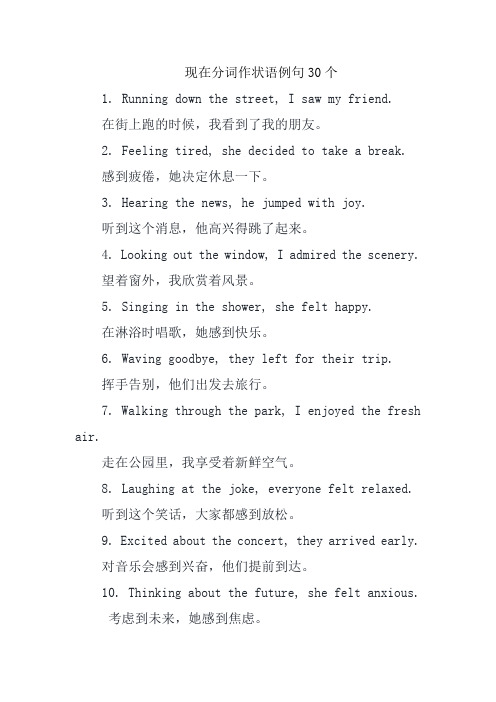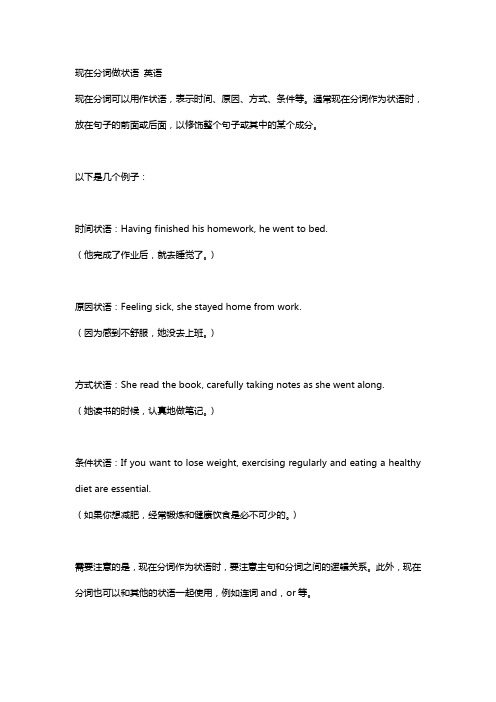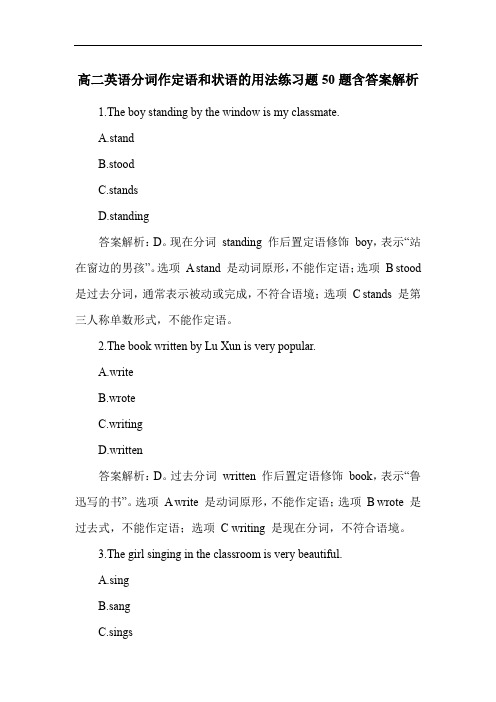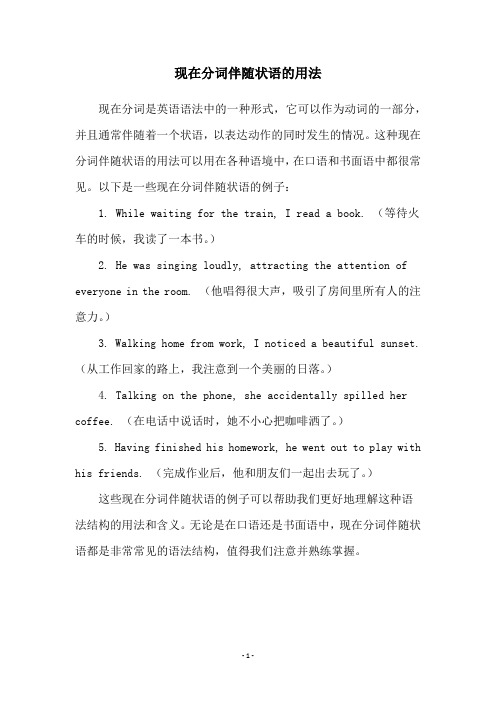高二英语现在分词做状语
现在分词做状语

现在分词做状语现在分词被用作状语。
其实大多数情况下,现在分词和它的关联成分一起作状语,也就是现在分词短语作状语,相当于它对应的状语从句。
大多数情况下,可以放在句首,也可以放在句尾。
例:1.作时间状语Entering the classroom, the students began to read English.一进教室,学生们就开始读英语。
(相当于As soon as/After they entered the classroom)2.作原因状语The girl doesn't feel like eating any food, being ill for a few days.这个女孩不想吃任何食物。
她已经病了几天了。
(相当于Because she has been ill for a few days或Because of her being ill for a few days)3.作条件状语Working hard, he will succeed in passing the English examination.如果他努力学习,他能通过英语考试。
(相当于从句If he works hard)4.作让步状语Being tired after work, he still insists on studying French.下班后很累,他仍然坚持学习法语。
(相当于Though he is tired after work或Though tired after work)5.作结果状语People all over the world sing the song, making it popular.全世界的人都唱这首歌,这使它流行起来。
(相当于so that they make it popular)6.作方式状语Travelling by car , we enjoyed many beautifull places.开车旅行时,我们欣赏了许多美丽的地方。
现在分词作状语例句30个

现在分词作状语例句30个1. Running down the street, I saw my friend.在街上跑的时候,我看到了我的朋友。
2. Feeling tired, she decided to take a break.感到疲倦,她决定休息一下。
3. Hearing the news, he jumped with joy.听到这个消息,他高兴得跳了起来。
4. Looking out the window, I admired the scenery.望着窗外,我欣赏着风景。
5. Singing in the shower, she felt happy.在淋浴时唱歌,她感到快乐。
6. Waving goodbye, they left for their trip.挥手告别,他们出发去旅行。
7. Walking through the park, I enjoyed the fresh air.走在公园里,我享受着新鲜空气。
8. Laughing at the joke, everyone felt relaxed.听到这个笑话,大家都感到放松。
9. Excited about the concert, they arrived early.对音乐会感到兴奋,他们提前到达。
10. Thinking about the future, she felt anxious.考虑到未来,她感到焦虑。
11. Studying hard, he passed the exam with flying colors.努力学习,他顺利通过了考试。
12. Cooking dinner, she listened to music.做晚餐时,她听着音乐。
13. Running late, he hurried to catch the bus.赶时间,他急忙去赶公交车。
14. Smiling at the compliment, she thanked him.对赞美微笑,她对他说了谢谢。
现在分词做状语 英语

现在分词做状语英语
现在分词可以用作状语,表示时间、原因、方式、条件等。
通常现在分词作为状语时,放在句子的前面或后面,以修饰整个句子或其中的某个成分。
以下是几个例子:
时间状语:Having finished his homework, he went to bed.
(他完成了作业后,就去睡觉了。
)
原因状语:Feeling sick, she stayed home from work.
(因为感到不舒服,她没去上班。
)
方式状语:She read the book, carefully taking notes as she went along.
(她读书的时候,认真地做笔记。
)
条件状语:If you want to lose weight, exercising regularly and eating a healthy diet are essential.
(如果你想减肥,经常锻炼和健康饮食是必不可少的。
)
需要注意的是,现在分词作为状语时,要注意主句和分词之间的逻辑关系。
此外,现在分词也可以和其他的状语一起使用,例如连词and,or等。
高二英语分词作定语和状语的用法练习题50题含答案解析

高二英语分词作定语和状语的用法练习题50题含答案解析1.The boy standing by the window is my classmate.A.standB.stoodC.standsD.standing答案解析:D。
现在分词standing 作后置定语修饰boy,表示“站在窗边的男孩”。
选项 A stand 是动词原形,不能作定语;选项B stood 是过去分词,通常表示被动或完成,不符合语境;选项C stands 是第三人称单数形式,不能作定语。
2.The book written by Lu Xun is very popular.A.writeB.wroteC.writingD.written答案解析:D。
过去分词written 作后置定语修饰book,表示“鲁迅写的书”。
选项A write 是动词原形,不能作定语;选项B wrote 是过去式,不能作定语;选项C writing 是现在分词,不符合语境。
3.The girl singing in the classroom is very beautiful.A.singB.sangC.singsD.singing答案解析:D。
现在分词singing 作后置定语修饰girl,表示“在教室里唱歌的女孩”。
选项A sing 是动词原形,不能作定语;选项B sang 是过去式,不能作定语;选项C sings 是第三人称单数形式,不能作定语。
4.The house being built now will be a hotel.A.buildB.builtC.buildsD.being built答案解析:D。
现在分词的被动形式being built 作后置定语修饰house,表示“正在被建造的房子”。
选项A build 是动词原形,不能作定语;选项B built 是过去分词,通常表示被动或完成,这里强调正在进行,不符合;选项C builds 是第三人称单数形式,不能作定语。
高二英语现在分词作状语

; https:/// 一键重装系统 小猪一键重装系统 ;2019.1
;
那座城镇拥有一处很大的草坪,简单改造就成为了一处前线机场. 参与向183师进行空中补给的部队齐聚于此,图皮科夫甚至亲自赶到现场. 在行动之前,他还要亲自检查一下货物.行动的指挥官,伊万诺夫就陪在图皮科夫的身边. "本来我作为参谋长,完全没有必要进入那个前线机场.如果是 监督任务的执行,方面军司令部派遣特派员即可.现在我来到了那里,你们自然也能意识到那次行动的重要性."图皮科夫给伊万诺夫提了醒,也让他明白司令部对行动的关切程度. 伊万诺夫把所有的机组人员召集起来,大家在机场列队,等待参谋长的检阅. 时间快要到十月,那些天的天气不是 很好.俄罗斯的秋雨季节已经到来,阴雨的天气对于空中飞行影响巨大.好在今日是个半阴天,任务应该可以顺利完成. 在图皮科夫面前,一百多位机组人员整齐的列队. 图皮科夫给予他们命令:"同志们,那次的任务非同小可.我们必须援助我们的同志,因为你们必须冒着生命危险深入敌后,将 货物准确的送抵普里佩特的沼泽地. 你们或许会质疑,为什么我们要出动大量的运输机,甚至疯狂的用轰炸机空投坦克.[ 超多好看]我现在就来告诉你们司令部的决意,因为那次任务除了实际的援助,更重要的是象征意义!" 在此之前,伊万诺夫和他的航空兵以及空勤,都对司令部的疯狂举动 所震惊.不少人在感慨,部队的高层绝对不懂得空军,伞兵背着降落伞空降无可厚非,现在居然要以同样方式空降坦克. 同时,所输送的物资里,毛毯和冬季军装是大多数,剩下的空间几乎都用于运输小麦粉. 图皮科夫的一番训话让大家明白过来,因为近卫183师是英雄的部队.那支部队获得了近 卫的称号,纯粹是他们用铁与血获得了.以一支步兵师的身份,歼灭和击溃三个德军师,甚至还有一个装甲师.在目前的战争中,那种战绩独一无二. 但因为表现太显眼
现在分词伴随状语的用法

现在分词伴随状语的用法
现在分词是英语语法中的一种形式,它可以作为动词的一部分,并且通常伴随着一个状语,以表达动作的同时发生的情况。
这种现在分词伴随状语的用法可以用在各种语境中,在口语和书面语中都很常见。
以下是一些现在分词伴随状语的例子:
1. While waiting for the train, I read a book. (等待火车的时候,我读了一本书。
)
2. He was singing loudly, attracting the attention of everyone in the room. (他唱得很大声,吸引了房间里所有人的注意力。
)
3. Walking home from work, I noticed a beautiful sunset. (从工作回家的路上,我注意到一个美丽的日落。
)
4. Talking on the phone, she accidentally spilled her coffee. (在电话中说话时,她不小心把咖啡洒了。
)
5. Having finished his homework, he went out to play with his friends. (完成作业后,他和朋友们一起出去玩了。
)这些现在分词伴随状语的例子可以帮助我们更好地理解这种语
法结构的用法和含义。
无论是在口语还是书面语中,现在分词伴随状语都是非常常见的语法结构,值得我们注意并熟练掌握。
- 1 -。
高中英语2024届高考复习现在分词作状语在写作中的运用知识讲解
现在分词作状语在写作中的应用首先我们得了解以下知识点:1.现在分词具有动词的一些特征,所以现在分词也有时态与语态的变化,具体如下:现在分词的一般式(以do为例):主动:doing被动being done现在分词的完成式:主动:having done被动having been done2.现在分词具有形容词和副词的句法功能,所以分词在句中可以充当表语、定语、补语与状语的功能作用。
针对在写作中的实际作用,本文将对现在分词做状语进行讲解。
一、现在分词做时间状语现在分词表示的动作和谓语动作同时发生或紧接着发生,就用一般式:V-ing例句1:Hearing the good news, they all jumped with joy.听到这个好消息,他们都高兴得跳起来。
可以用时间状语从句替换:When they heard the good news, they all jumped with joy.例句2:Standing on the stage, a sense of tension welled up in my heart.站在舞台上,紧张感油然而生。
可以用时间状语从句替换:When I stood on the stage, a sense of tension welled up in my heart.【仿写练习】看着这些照片,往日记忆涌上心头。
1.用现在分词作时间状语:_______________________________2.可以改为时间状语从句:_______________________________【答案】1.Seeing these photos, memories of those old days flooded into his mind2.When I saw these photos, memories of those old days flooded into his mind.在强调现在分词动作先于谓语动作时,用完成式:having doneeg:Having eaten her lunch, the girl rushed out.那女孩吃完了午饭就跑出去了.(先吃eat 后跑出rush out)Having thought about the present situation for a while, Roy decided to apologize to Jane .思考现状一会儿后,Roy 决定向Jane道歉。
分词作状语的用法
分词作状语的用法分词作状语是英语语法中的一个重要部分,它可以使句子更加生动而有力。
本文将说明分词作状语的用法及相关注意事项。
一、分词作时间状语分词作时间状语可以表示动作发生的时间或时间先后顺序。
1. 过去分词作时间状语:Having finished his homework, he went out to play.过去分词短语作时间状语,表示主句发生的时间在过去分词的动作发生之后。
2. 现在分词作时间状语:Hearing the news, they were very excited.现在分词短语作时间状语,表示主句发生的时间在现在分词的动作发生之时。
3. 不定式短语作时间状语:To improve his English, he practices speaking every day.不定式短语作时间状语,表示主句发生的时间是为了达到不定式的目的。
二、分词作原因状语分词作原因状语可以表示动作发生的原因或原因结果关系。
1. 过去分词作原因状语:Being tired, she decided to go to bed early.过去分词短语作原因状语,表示主句发生的原因是过去分词的动作。
2. 现在分词作原因状语:Seeing the dark clouds, they decided to bring umbrellas.现在分词短语作原因状语,表示主句发生的原因是现在分词的动作。
3. 不定式短语作原因状语:To save money, he stopped eating out.不定式短语作原因状语,表示主句发生的原因是不定式的目的。
三、分词作条件状语分词作条件状语可以表示动作发生的条件或条件结果关系。
1. 过去分词作条件状语:Given the chance, he would travel around the world.过去分词短语作条件状语,表示主句发生的条件是过去分词的动作。
高中英语知识点归纳分词作状语的常见形式
高中英语知识点归纳分词作状语的常见形式分词作状语指的是分词在句子中修饰主句动词,起到状语的作用。
在高中英语中,学习分词作状语是一个重要的语法知识点。
下面将介绍分词作状语的常见形式。
一、现在分词作状语现在分词作状语表示的动作与主句动作同时进行。
1. 表示伴随状况例如:- She entered the room, smiling.她一边走进房间,一边微笑着。
- The girl sat on the bench, reading a book.那个女孩坐在长凳上,一边读书。
2. 表示原因状况例如:- Being tired, he went to bed early.因为疲倦,他早早上床睡觉了。
- The weather being bad, they stayed at home.由于天气不好,他们呆在家里。
3. 表示条件状况例如:- I will go to the park, weather permitting.天气允许的话,我会去公园。
- We went out, the rain having stopped.雨停了,我们出去了。
4. 表示方式、手段状况例如:- He ran to the bus stop, hoping to catch the bus.他跑到公交车站,希望能赶上公交车。
- The boy solved the math problem, using the formula he had learned.这个男孩用他学过的公式解了这个数学问题。
二、过去分词作状语过去分词作状语表示的动作发生在主句动作之前。
1. 表示时间状况例如:- Having finished his homework, he went out to play.他完成了作业后,出去玩了。
- We arrived at the airport, having missed the flight.我们到达机场时,航班已经错过了。
高中英语语法点总结
高中英语语法点总结高中英语语法点总结高中英语语法点总结篇1(1)现在分词与过去分词作状语的区别。
现在分词做状语与过去分词做状语的最主要区别在于两者与所修饰的主语的主动与被动关系的区别。
1)现在分词作状语时,现在分词的动作就是句子主语的动作,它们之间的关系是主动关系。
He went out shutting the door behind him. 他出去后将门随手关上。
Not knowing what to do, he went to his parents for help. 由于不知如何办是好,他去找父母帮忙。
2)过去分词作状语时,过去分词表示的动作是句子主语承受的动作,它们之间的关系是被动关系。
Given more attention, the trees could have grown better. 如果对这些树多关心一些,它们本来会长得更好。
Faced with difficulties, we must try to overcome them. 在遇到困难的时候,我们必须设法克服。
(2)动词不定式和分词作状语的区别1)分词作状语一般表示伴随,而不定式常常表示目的。
They stood by the roadside talking about the plan.他们站在路边谈论着这个计划。
(伴随)They stood by the roadside to talk about the plan.他们站在路边为的是谈论这个计划。
(目的)2)分词作状语放在句子开头,除表示原因之外有时表示时间或条件。
动词不定式作状语时,除了表示目的以外,还表示结果或原因。
Reading attentively,he forgot the time for lunch.由于在专心读书,他忘了吃午饭的时间。
(原因)Reading carefully,he found something he had not knownbefore.他仔细读书时,发现了一些从前不知道的东西。
- 1、下载文档前请自行甄别文档内容的完整性,平台不提供额外的编辑、内容补充、找答案等附加服务。
- 2、"仅部分预览"的文档,不可在线预览部分如存在完整性等问题,可反馈申请退款(可完整预览的文档不适用该条件!)。
- 3、如文档侵犯您的权益,请联系客服反馈,我们会尽快为您处理(人工客服工作时间:9:00-18:30)。
高二英语现在分词做状语语法一:现在分词做状语现在分词(动词的ing 形式)做状语时,通常都表示主语正在进行的另一动作,其逻辑主语必须与句子的主语保持一致,且必须与句子的主语是逻辑上的主谓关系;动词的ing形式表示的动作是次要动作。
现在分词可以做时间,条件,结果,让步,方式等状语。
相当于相应的状语从句。
作时间,原因或条件时,通常位于主句前面,作方式,伴随或结果状语时,通常位于主句后面。
如果分词所表示的动作和谓语的动作同时发生或几乎同时发生,用现在分词的一般式。
如果分词动作明显在谓语动词之前发生,用现在分词的完成式。
(having done),在作时间状语的分词前,可加连词while, when,介词after, before, on等。
一. 做伴随状语:分词等于and连接两个动词或分句。
1:The dog came in. It followed its master. =The dog came in, following its master.2:The children ran out of the room, laughing and talking merrily.3:They stood there for an hour, watching the game.二.原因状语相当于as, since, because等引起的原因状语从句,常位于句首,句中或句末。
1. He was a brave man. He decided to return to France. = Being a brave man, he decided to return to France.2:Seeing nobody at home, she decided to leave them a note.3:No t knowing her address, we couldn’t get in touch with her.4:Being so poor in those days, we couldn’t afford to send the boy to hospital.5.Having worked among the peasants for many years, heknew them very well.6. Not having received an answer, he decided to write another letter.三.时间状语,相当于when, while ,as 等引导的时间状语从句,常位于句首或句末。
1:First he returned to France. Then he was put into prison. =After he returned to France, he was put into prison. =Having returned to France, he was put into prison.2:Having arrived at the factory, they immediately set to work.Be careful when crossing the street. 3:Don’t mention this while talking to him.4:On arriving in London, he managed to get in touch with her.=As soon as he arrived in London.5: Having read the letter, she got very excited.四.条件状语,相当于一个if 等引导的条件状语从句,常位于句首。
1:Working hard, you will succeed.2. If I know anything about it, I will tell you all. =Knowing anything about it, I will tell you all.3.-I could go and get someone to bring the car.-No, thanks. I’ll be better if walking五:结果状语现在分词表示必然结果,前可加thus,不定式表意外的结果,前可加only。
1:Her husband died in 1942, leaving her with five children.2:The bus was held up by snowstorm, thus causing the delay.3:He was caught in the rain, thus making himself catch cold.六:让步状语:相当于although, though, even if, even though 引起的让步状语从句,常位于句首。
1. Although he had bought a lot of books for the exam, he failed in it because of the learning method.=Buying a lot of books for the exam, he failed in it because of the learning method.2. Though they knew all this, they made me pay for the damage.=knowing all this, they made me pay for the damage.七.方式状语分词等于介词with引起的方式状语或and并列的两个谓语动词.1.Walking slowly,I approached (靠近)the little = By walking slowly, I approached the little window.window.2.He stood leaning against(靠在..上)the wall.=He stood and leaned against the wall.八:现在分词的完成式指分词所表示的动作发生在主句中谓语动词之前,若分词所表示的动作与主语之间是主谓关系,则用having done, 若是动宾(被动)关系,则用having been done.1;Having worked in the country for three years, he knew how to grow vegetables.2: Having been translated into several languages, the book became famous all over the world.3:Having finished his homework, he went to bed.4: Having lived in New York for years, I know each part of it very well.九:现在分词独立成分的特殊使用:generally speaking:一般来讲,frankly speaking : 坦白地说。
exactly speaking,严密地讲,正确地说。
judging from / by…,从….可以判断出来。
considering ….考虑到…1: Generally speaking, girls are more interested in literature than boys.2: Judging from her accent, she must come from Arabian countries.十:现在分词与过去分词作状语的区别。
现在分词与过去分词做状语的最主要区别在于两者与所修饰的主语的主动与被动关系的区别。
(1)现在分词作状语时,现在分词的动作就是句子主语的动作,它们之间的关系是主动关系。
1. He went out shutting the door behind him. 他出去后将门随手关上。
2. Not knowing what to do, he went to his parents for help. 由于不知如何办是好,他去找父母帮忙。
(2)过去分词作状语时,过去分词表示的动作是句子主语承受的动作,它们之间的关系是被动关系.1. Faced with difficulties, we must try to overcome them. 在遇到困难的时候,我们必须设法克服。
2. Given more attention, the trees could have grown better.语法二:动词不定式和动名词做宾语的区别。
一:.通常只能接不定式作宾语的动词:agree (同意);offer (提出);intend,plan (打算,计划);demand,ask (要求);promise (答应);help (帮忙);prepare (准备);decide (决定);refuse (拒绝);choose (选择,决定);wish,hope,want,expect (希望,想要);fail (不能;忘记);pretend (假装);manage (设法);determine (决心)afford(买得起,但付得起),arrange(安排,准备),aim(以..为目标,目的),beg(恳求,祈求),claim(声称),happen(碰巧,恰巧发生了某事),seem, hesitate(犹豫不决)。
同意提出做计划,要求答应来帮忙。
准备决定遭拒绝,敢于选择有希望。
不能做到莫假装,设法做成决心假。
恳求安排买得起。
恰巧似乎声称目的不犹豫。
1: He agreed to apologize to me.2. She offered to help me.3. We intend to get in touch with you through Email.4. He demands to be prized.5. She pretended not to see me when I came in.6. She demands to live alone.7. He promised to keep in touch with me.8. My sister helped me to finish / finish my homework.9. He prepared himself to accept failure.10. He decide to tidy my house.11. The hostess refused to invite her.12. He failed to pass the examination through carelessness.13. He chose not to go home until later.14. She expects to fail the exam.15. The cat manages to pat something invisible.16.They claim to have discovered a cure for the disease.17.We happened to be in the neighbourhood.18.He hesitated to take such a big risk.19.He seems (to be) quite happy.二; 通常只能接动名词做宾语的动词:admit,consider,suggest/advise,承认考虑建议avoid,delay/ put off,practise避免推迟练习allow/permit,finish,appreciate允许完成感激forbid,mind,imagine禁止介意想象escape, quit/give up,enjoy逃避放弃喜欢deny, risk, miss否认冒险错过can’t help, look forward to,禁不住盼望反对stick to, lead to, ,can’t stand,be accustomed to/ get/be used to,pay attention to坚持导致忍受习惯1. I appreciate having been given the opportunity to study abroad two years ago.She admitted having done wrong.2. I consider reading this series of books written by Luxun.3. The teacher suggested not violating classmates’ personal matters.4. He advises coming up to here..5. He always avoids talking to me.6. He delays / put off give a large amount of moner to me.7. We are practicing writing letters.8. We permit / allow you writing here.9. I have finished reading this book.10. The doctor forbids him smoking and drinking.11. Would you mind my opening the window?12. Can you imagine him becoming famous as an actor?13. He always escapes coming bake home.14. My father has quit smoking15. Do you enjoy teaching?16. He denied having seen these watches before.17. He risked getting caught in a storm yesterday.他昨天冒遭遇风暴之险。
